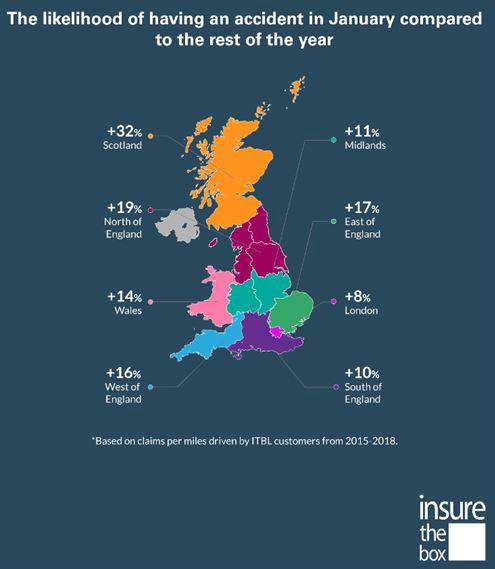Drivers, it appears, may have more reason to be blue this January as new analysis from UK telematics insurance pioneer, insurethebox, reveals five out of the 10 riskiest days of the year to drive fall in January. Drivers in Scotland see the biggest risk as they’re 32% more likely to have an accident, with the North and West of England 19% and 17% more likely to have an accident in January than the rest of the year.
With Christmas and new year done and dusted, January is traditionally seen as the most depressing month of the year; credit card statements with the Christmas overspend fall on mats, the weeks drag until the next pay cheque; and dark evenings linger, sending even the cheeriest into gloom. January as the month most accident claims take place adds to the month’s dreary forecast for drivers.
The five riskiest days when drivers are most likely to make a claim fall between the 12th and 20th of January. Just two of the 10 riskiest days of the year fall in November; there is one each in February, March, and June.
Gary Stewart, Service Manager at insurethebox said: “Analysis of over 5 billion miles of driving data shows our customers do drive less in January, however when your look at the percentages of claims being made against the miles driven, this month is in fact the riskiest of the year to drive.
“With its shorter, darker days and often freezing temperatures, January has some of the most challenging driving conditions of the year especially the further North you go which probably explains why drivers in Scotland see accidents increase by almost a third this month.
London, the South of England and the Midlands see the smallest rise in accidents in January, at 8%, 10% and 11% respectively. But that’s no reason for motorists in these regions to become complacent. And the risk is even greater for the newer, least experienced drivers.”
Over 760,000 motorists passed their practical driving test in 2019 and for many driving in the harsher winter weather conditions will be a first. Young, inexperienced drivers are particularly vulnerable as hazardous conditions will be a completely new experience.

|

